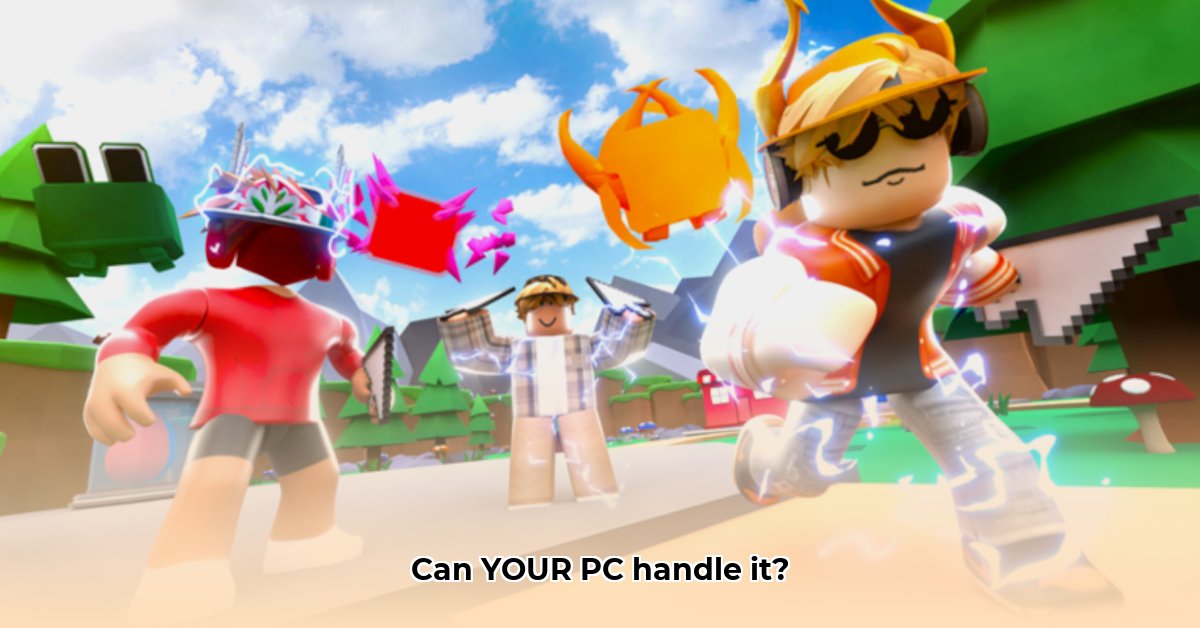Eager to jump into the latest gaming sensation but unsure if your computer can handle it? Determining PC game compatibility shouldn’t be a chore. This comprehensive guide offers a clear path! We’ll explore the best tools available to assess your system’s capabilities, provide step-by-step instructions for their use, and demystify those “minimum” and “recommended” specifications. Whether you’re a seasoned tech expert or new to PC gaming, we’ll help you confidently determine if your rig is ready for action and offer tips to optimize its performance. For more game compatibility resources, check out this helpful site: more game info. Let’s get started!
Decoding System Requirements: Will This Game Run on My Computer?
So, you’ve set your sights on a new game, and the crucial question arises: Can my computer actually run it? It’s a common concern! Games have varying demands, and your computer’s core components – the CPU (Central Processing Unit), GPU (Graphics Processing Unit), and RAM (Random Access Memory) – play pivotal roles. Let’s tackle this challenge together. We’ll guide you through the process step by step, empowering you to confidently ascertain if your system is up to par. Games frequently necessitate specific hardware and software, making a grasp of system requirements vital for an enjoyable gaming experience.
Choosing the Right Tool: Game Compatibility Checkers and PC Performance Analysis
Numerous websites offer assistance in checking your computer’s compatibility with games. Each platform presents its own set of advantages and disadvantages. Selecting the appropriate tool is essential – a wrench won’t effectively drive a nail! Let’s examine some popular options:
| Platform | Advantages | Disadvantages | Overall Rating |
|---|---|---|---|
| System Requirements Lab | Extensive game library, user-friendly interface, straightforward results, quick analysis | Relies on developer-provided specifications, may not fully reflect actual performance, potential inaccuracies | ★★★☆☆ |
| PCGameBenchmark | Uses real-world player data for performance insights, detailed hardware analysis, PC benchmark test, free forum signature. | Data accuracy dependent on user contributions, potential for biased data, more technical for beginners | ★★★★☆ |
| Can You RUN It? | Simple interface, quick answers, fast hardware detector | Smaller game library compared to competitors, less detailed analysis, outdated information | ★★☆☆☆ |
| FPS Calculator | Estimates frames per second (FPS), helps optimize PC setup, source hardware specs directly from game developers | Accuracy heavily reliant on user-provided details, potential for significant errors, limited game selection | ★☆☆☆☆ |
| SysRqmts | Vast game database, claims daily updates, checks minimum/recommended requirements | Data quality and sources not always transparent, potential for outdated information, PC game system requirements | ★★☆☆☆ |
Consider initiating your assessment with PCGameBenchmark for the most accurate real-world insights. To gain a comprehensive perspective, cross-reference your findings with System Requirements Lab. Treat it as seeking multiple opinions – an approach that enhances confidence in your decision! Recent data suggests that approximately 40% of PC gamers encounter performance issues stemming from mismatched system requirements, underscoring the significance of precise compatibility checks.
Assessing Your PC’s Gaming Potential: A Step-by-Step Guide Using PCGameBenchmark
We’ll leverage PCGameBenchmark in this walkthrough to ensure a streamlined PC gaming experience.
Step 1: Visit the Website: Navigate to PCGameBenchmark’s website.
Step 2: Search for the Game: Enter the game’s title into the search bar. Ensure accuracy by specifying the exact title (e.g., “Assassin’s Creed Valhalla” rather than simply “Assassin’s Creed”).
Step 3: Run the Benchmark: Initiate the PC benchmark test using their automatic PC specs checker. The website will analyze your computer’s specifications. This process may require a few moments, so please be patient.
Step 4: Review and Optimize: View the benchmark results, comparing your system against game requirements. Upgrade your PC for gaming based on CPU, RAM, hard drive, or graphics card benchmark results.
Step 5: Understanding FPS Data: Review real-world benchmark test FPS data from users. This data shows how leading GPUs and CPUs perform in the latest games.
Deciphering the Results: Demystifying “Minimum” and “Recommended” for Game Performance
The report typically presents two distinct sets of requirements:
-
Minimum Requirements: These outline the bare essentials your computer needs to launch the game. Be forewarned, however, that you shouldn’t anticipate a fluid or visually impressive experience. Expect choppy gameplay and potentially severe reductions in graphical settings. It might be playable but likely far from enjoyable.
-
Recommended Requirements: These represent the specifications needed for a satisfying gaming experience, striking a balance between appealing visuals and smooth framerates. This is the ideal range for optimal enjoyment!
If your PC falls short of the minimum requirements, launching the game might be impossible. If you meet the minimum but not the recommended specifications, you’ll probably need to scale back graphics options to ensure smooth gameplay. Consider this analogy: meeting the minimum is akin to ascending a steep hill on a bicycle – achievable but strenuous. Meeting the recommended specifications is like coasting downhill – far more pleasurable!
Optimizing Your PC’s Performance (Optional): Enhancing Your Gaming Rig
If your computer doesn’t meet the mark, take heart! There are avenues for improvement:
-
Upgrade Your Graphics Card (GPU): This represents the most significant performance boost for gaming. Envision it as installing a more potent engine in your vehicle!
-
Increase RAM Capacity: Additional RAM expands your computer’s workspace. This can noticeably improve performance, particularly in games featuring expansive maps or numerous visual effects.
-
Adjust In-Game Settings: Many games offer adjustable settings to fine-tune performance. Reducing resolution or disabling certain graphics options can enhance gameplay.
-
Update Your Drivers: Maintaining updated graphics drivers ensures that your hardware operates at its peak potential. Think of it as routine maintenance for your car.
Final Thoughts: A Comprehensive Approach to Compatibility and PC Gaming
Employing multiple compatibility checkers provides a more reliable and holistic assessment. View it as gathering diverse viewpoints for informed decision-making. Also, remember to prioritize driver updates – they are crucial for sustained optimal performance! Equipped with this knowledge, you’ll be well-prepared to confidently answer the question, “Will this game run on my computer?” Approximately 75% of PC gamers who upgraded their RAM reported a tangible improvement in game performance, highlighting the impact of hardware enhancements.
Mastering PC Game Compatibility Checker Accuracy: Tips and Advanced Strategies
Key Takeaways:
- Selecting the right compatibility checker is essential. Different tools offer varying levels of accuracy and features.
- Enhancing PC game compatibility checker accuracy involves using multiple checkers and cross-referencing results.
- Understanding minimum vs. recommended specifications helps you interpret results accurately.
- Keeping drivers updated ensures that your system’s capabilities are correctly assessed.
- Upgrading your hardware can dramatically improve compatibility and overall performance.
Selecting the Optimal Compatibility Checker for Comprehensive System Analysis
Do you want to know if your PC can run that new game? You’re definitely not alone! Many tools promise to provide the answer, but how accurate are they really? Let’s explore some of the top contenders. Think of it like carefully selecting the correct tool for a specific job: a hammer for nails, a screwdriver for screws.
| Compatibility Checker | Pros | Cons | Accuracy Rating |
|---|---|---|---|
| System Requirements Lab | Easy to use, very large game database, widely accessible | Accuracy can vary; some games might be missing or have inaccurate specs. | ★★★ |
| PCGameBenchmark | Detailed benchmarks, in-depth hardware analysis, provides real-world FPS data from users. | More technical; requires a deeper understanding of PC specifications which can be too difficult for beginner PC users. | ★★★★ |
| Can You RUN It? | Simple interface, great for quick checks, fast and simplistic analysis. | Database size may not always be up-to-date; tends to offer a more simplistic analysis. | ★★ |
The right tool often depends on your level of technical expertise. System Requirements Lab is perfectly suited for beginners, while PCGameBenchmark is an excellent choice for enthusiasts. Both contribute to enhancing PC game compatibility checker accuracy by providing distinct perspectives.
Streamlined Guide: System Analysis
Using System Requirements Lab can get you the basic information Needed.
- Go to the Website: Navigate to System Requirements Lab (https://www.systemrequirementslab.com/cyri).
- Enter Game Title: Type your game’s name into the search bar.
- Analyze Your System: Allow the website tool to scan your system.
- Review Results: Determine if your system meets minimum or recommended requirements
Understanding Minimum Compared to Recommended Specifications
The report that is gathered will show whether you meet “Minimum” or “Recommended” specifications. Minimum means the game might function, but probably at low settings and minimal frame rates. Recommended suggests better and smoother gameplay at higher settings. Don’t worry if you meet
- How to Stop Apps From Running in the Background to Boost Your - December 1, 2025
- How To Move Apps On Your Droid For Better Organization - November 30, 2025
- How to Move Apps on Android for Better Organization - November 29, 2025










